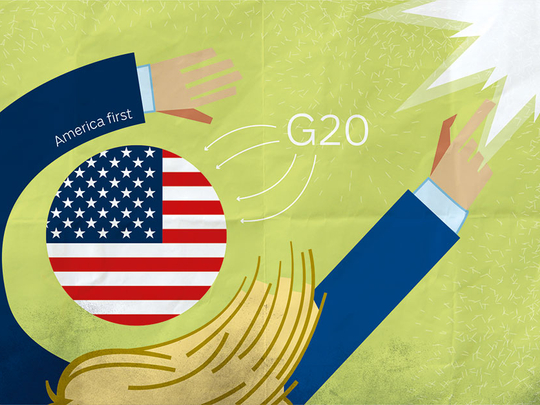
United States President Donald Trump just concluded a second overseas trip to further advance America’s interests and values, and to strengthen its alliances around the world. Both this and his first trip demonstrated the resurgence of American leadership to bolster common interests, affirm shared values, confront mutual threats and achieve renewed prosperity.
Discussions with world leaders highlighted extraordinary potential: Vast supplies of affordable energy, untapped markets that can be opened to new commerce, a growing number of young people seeking the chance to build better futures in their homelands and new partnerships among nations that can form the basis for lasting peace. At every opportunity abroad, Trump articulated his vision for securing the American homeland, enhancing American prosperity and advancing American influence.
Meetings in Poland and at the Group of 20 summit conference in Germany focused on building coalitions to get the best possible outcomes for America and for our allies. The United States cannot be a passive member of international organisations. We are working with friends to confront common threats, seize mutually beneficial opportunities and press for solutions to shared problems.
In Warsaw, Trump spoke to the Polish people and reiterated America’s commitment to mutual support and defence of Poland and America’s Nato allies against common threats. He affirmed that a “strong Poland is a blessing to Europe” and that “a strong Europe is a blessing to the West and to the world”.
He also met with 12 leaders of the Three Seas nations and pledged America’s commitment to expanding access to affordable and reliable energy in the Baltic States, Central Europe and the Balkans. Helping countries diversify their energy sources strengthens economies, creates jobs and prevents adversaries from using energy to intimidate or coerce. During a dinner Trump hosted with President Moon Jae-in of South Korea and Prime Minister Shinzo Abe of Japan in Hamburg, the leaders agreed on a common strategy to confront the threat of North Korea and ensure the security of Northeast Asia and the United States.
Central to Trump’s approach is that the US will seek areas of agreement and cooperation while still protecting American interests. At the G20, the US supported open trade, but insisted that it be fair. The G20 communique recognised “the importance of reciprocal and mutually advantageous trade”, and all leaders agreed to do more to eliminate excess capacity in industrial sectors such as steel. Because of American leadership, all G20 nations joined together in making an urgent call “for the removal of market distorting subsidies and other types of support by governments” to “foster a truly level playing field”.
The G20 leaders agreed that a strong economy and a healthy planet are mutually reinforcing. America will continue to lead by example in demonstrating that market forces and technology-driven solutions are the most effective means of protecting the environment while fuelling economic growth.
On migration, the leaders reaffirmed the “sovereign right of states to manage and control their borders”. They discussed the need to “address the root causes of displacement” and create better opportunities for people to remain in their home countries and rebuild their communities.
Perhaps most important, Trump affirmed on this trip that “America First” is grounded in American values — values that not only strengthen America, but also drive progress throughout the world. America champions the dignity of every person, affirms the equality of women, celebrates innovation, protects freedom of speech and of religion, and supports free and fair markets.
For example, to help empower women across the globe, the US joined with the World Bank in an initiative to provide more than $1 billion (Dh3.67 billion) to advance entrepreneurship. This effort will help women in developing countries gain increased access to capital, markets and networks needed to start and grow businesses in the modern economy. And the US remains the world’s single largest source of humanitarian assistance. At the G20, we committed an additional $639 million to help save the lives of millions of people threatened by famine — and called on other nations to join us in doing more to address this humanitarian catastrophe.
Of course, the US — along with nations around the world — continues to face serious challenges, including the menace of terrorism and the threat of rogue regimes. Working with other nations allows America its best opportunity to address these challenges. For example, in a meeting with President Joko Widodo of Indonesia, the world’s largest Muslim-majority nation, the two leaders affirmed the commitment made in Saudi Arabia to block funding for terrorists and those who advance their hateful ideology. In the formal communique on countering terrorism, all G20 nations affirmed that we “strongly condemn all terrorist attacks worldwide and stand united and firm in the fight against terrorism and its financing”. In many discussions with allies and partners at the G20, leaders agreed that North Korea is a global threat that requires collective action.
“America First” is rooted in confidence that its values are worth defending and promoting. This is a time of great challenge for America’s friends and allies around the globe — but it is also a moment of extraordinary opportunity. The American delegation returned from the trip with tremendous optimism about the future and what the US, its allies and partners can achieve together.
— New York Times News Service
Gary D. Cohn is the director of America’s National Economic Council. Lt General H.R. McMaster is America’s National Security Adviser.







